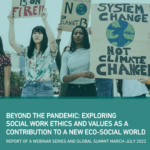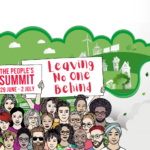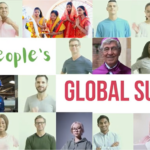Forum Replies Created
-
AuthorPosts
-
David N Jones
ModeratorThe Open Mic is now CLOSED. Best wishes to one and all until our next meeting – let’s hope it will not be too long.
David N Jones
ModeratorThanks to everybody who contributed to the Open Mic sessions over the period of this Summit. We have recorded these inputs and have taken note of them in the People’s Charter which will be launched at the end of the conference.
July 2, 2022 at 9:38 am in reply to: Cooperaative Healthcare – utopia or best practive in p;ost-Covid era? #7390David N Jones
ModeratorThanks Victor – see also our webinar on working conditions in health and social care. Similar messages. Why is it so difficult for managers in health and social care to apply the core knowledge of our professions in the way services are managed?! Global survey of the working conditions of social workers by IFSW: David N.Jones; Jermaine Ravalier et.al https://www.youtube.com/watch?v=7Jn9d3gW9xQ
David N Jones
ModeratorGood morning, good evening, good afternoon and welcome to the final Open Mic session of the Global Summit! I am your moderator for this session and look forward to final contributions to our discussion about how the peoples of the world can save our planet and work towards a new ecosocial world! I look forward to reading your comments.
David N Jones
ModeratorMany thanks Dolly – It is worth looking out for the Global People’s Charter which will be launched at the end of this Summit. I think it will say something about these matters. Further reflections will be welcome before and after that launch.
David N Jones
ModeratorWe are coming to the end of the Friday 19.00 UTC Open Mic session. Thanks to those who have been reading. The open mic space remains open 24/7 for more comments until Saturday.
David N Jones
ModeratorThe importance and value of using a variety of sources of knowledge in social work, including user experiences and knowledge, was explored in 2003 by the Social Care Institute for Excellence as a basis for its work over several years. Well worth a read if you can find it!
Pawson, R., A. Boaz, L. Grayson, A. Long and C. Barnes (2003). Types and quality of knowledge in social care. London, Social Care Institute for Excellence.
Pawson, R., Boaz, A., Grayson, L., Long, A. and Barnes, C., 2003. Types and quality of social care knowledge. Stage two: Towards the quality assessment of social care knowledge. ESRC UK Center for Evidence Based Policy and Practice: Working Paper, 18, pp.1-31.
-
This reply was modified 1 year, 9 months ago by
David N Jones.
-
This reply was modified 1 year, 9 months ago by
David N Jones.
David N Jones
ModeratorThe challenges and the pain are well recognised, Wai-Sum. Sadly we see many governments preventing expression of opinion. Freedom of expression is a precious freedom where it exists. I can only say make choices with care.
David N Jones
ModeratorDavid N Jones
ModeratorI heard recently from a senior cardiac doctor, in a radio programme, that cardiology is the field of medicine with the highest proportion of research based practices – in other words actions which doctors and surgeons take to treat heart problems which are guided by robust research. Yet only 15% of practice is guided by robust, double-blind, highest level research (in the sense of what is recognised by the medical profession). In other words, 85% of the practice is NOT research based but derived from applying practice and experience. Other fields of medicine have LOWER ratios of research informed practice. In the light of that, social work compares not badly. We should robustly defend experience informed (including indigenous) social work practice whilst always looking to test the relevance and effectiveness of what we do and being ready to learn and change.
Sir Martin Landray on saving over a million lives – BBC The Life Scientific https://www.bbc.co.uk/programmes/m0018ns0
David N Jones
ModeratorSoft systems, at first sight, looks like a methodology that reflects the reality of social work decision making.
David N Jones
ModeratorGreetings to all on this penultimate day of the People’s Summit. I am David Jones and I am the moderator for this Friday session of the open mic. I look forward to your comments.
David N Jones
ModeratorThe description of soft systems methodology appears to resonate strongly with the reality of social work practice in many contexts – at a micro and macro level.
David N Jones
ModeratorThis Global Summit process has emerged from many sources but one of them was the world social work conference in Hong Kong in 2010 when we agreed the Global Agenda for Social Work and Social Development. That shaped the evolution of advocacy for social work by IFSW, IASSW and ICSW over the following decade and strengthened the voice of global social work. Hong Kong, and the many colleagues in HK who planned and supported that conference, have therefore played a key role in raising awareness. The political situation in many countries is now VERY challenging, including my own UK. There is no easy solution but the People’s Summit offers a channel for voicing people’s concerns and supporting each other in difficult times. The world faces absolutely basic threats to our very survival and leaders will have to listen or they will lead us to destruction. Hong Kong is one of my favourite cities, with a vibrant social work community which has made a disproportionate contribution to world social work. I look forward to my next visit.
David N Jones
ModeratorSorry that there have not been more responses to this invitation. As Sarah suggests, perhaps there is more debate around the formal presentations. I think that there is something in the culture of social work which pulls us away from telling positive stories – because we know these are not OUR stories to tell. when things go well, it is because people have seized their own destiny – whatever the challenges they face – and find personal resources to transform their futures. Social workers facilitate and enable but don’t CREATE the change. In a way that is different from many other professions and skills where there is a specific thing which can be identified as the contribution of the ‘professional’ or ‘practitioner’. But facilitating and enabling are such needed and positive qualities and skills that somehow we should find ways to describe them and feel proud when we can demonstrate them in our practice. I have shared around this observation around the world in many places and it seems to resonate with social workers. I would be interested in reflections of others on these ideas.
In essence, social workers cannot expect to be valued and supported if we do not find a language to describe the importance of what we do!
-
This reply was modified 1 year, 9 months ago by
-
AuthorPosts






